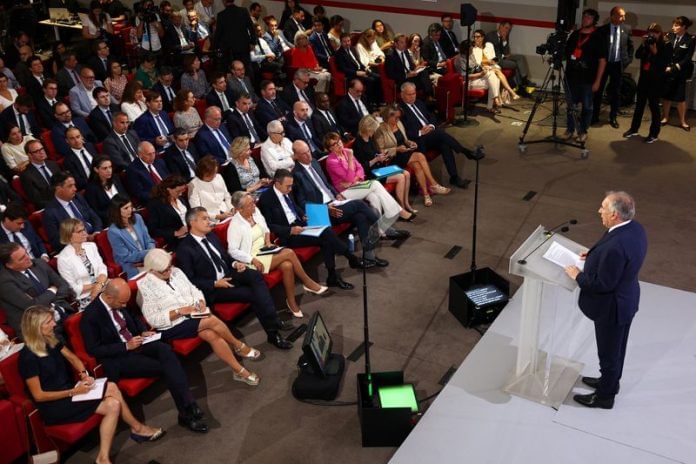By Elizabeth Pineau
PARIS (Reuters) -France’s minority government could be ousted next month after three main opposition parties said they would not back a confidence vote which Prime Minister Francois Bayrou announced for September 8 over his plans for sweeping budget cuts.
The far-right National Rally and the Greens said they would vote against him. The Socialists, on whose vote Bayrou’s fate largely lies, said they did not see how they could back him – unless he changes tack on the budget, which they did not see as likely to happen.
If he loses the confidence vote in the National Assembly, Bayrou’s government will fall.
The uncertainty spooked investors, pushing the risk premium on French bonds over their German equivalents up 5 basis points to their highest level since mid-June. The CAC-40 index of leading French shares ended the day down 1.6%.
If the government falls, President Emmanuel Macron could name a new prime minister immediately or ask Bayrou to stay on as head of a caretaker government, or he could call a snap election.
Macron lost his last prime minister, Michel Barnier, to a no-confidence vote over the budget in late 2024, after just three months in office following another snap election in July that year.
Bayrou acknowledged seeking the confidence of a very fragmented parliament was a risky bet.
“Yes it’s risky, but it’s even riskier not to do anything,” he told a press conference, referring to what he said was the major danger the country faced due to its huge debt pile.
The confidence vote, he said, would gauge whether he had enough support in parliament for his 44 billion euro ($51.51 billion) budget squeeze, as he tries to tame a deficit that hit 5.8% of gross domestic product last year, nearly double the official EU limit of 3%.
Even if the government wins the confidence vote, it would only mean he has support for his views on France’s fiscal woes, with a vote on the actual budget itself due later in the year.
Bayrou has proposed scrapping two public holidays and freezing welfare spending and tax brackets in 2026 at 2025 levels, not adjusting them for inflation. He said his proposal to scrap the bank holidays could be tweaked.
‘QUITE STUBBORN’
Far-right party chief Jordan Bardella said Bayrou had de facto announced “the end of his government” by calling for the vote.
“The RN will never vote in favour of a government whose decisions are making the French people suffer,” he said on X. Leader Marine Le Pen said the RN would vote against Bayrou – as did the Greens.
The hard left France Unbowed also said the vote would mark the end of the government.
The votes of Socialist lawmakers will be decisive for Bayrou’s fate because if they join other left-wing parties and the far right in voting against the government, there will likely be enough votes to oust it.
Socialist lawmaker Arthur Delaporte, a party spokesman, said Bayrou was “deaf to the demands of the French”.
“I don’t see how we could vote the confidence,” Delaporte told reporters. He opened the door to talks if Bayrou was willing to change his budget plans. “For now, he seems quite stubborn,” he said.
The confidence vote will take place just two days before planned protests, which have been called for on social media and backed by leftist parties and some unions.
The September 10 call for general protests has drawn comparisons to the Yellow Vest protests that erupted in 2018 over fuel price hikes and the high cost of living.
The “gilets jaunes” protests spiralled into a broader movement against Macron and his efforts at economic reform.
($1 = 0.8536 euros)
(Additional reporting by Makini Brice, Dominique Vidalon, Gabriel Stargardter, Leigh Thomas; Writing by Ingrid Melander; Editing by David Holmes and Alison Williams)
Disclaimer: This report is auto generated from the Reuters news service. ThePrint holds no responsibility for its content.




